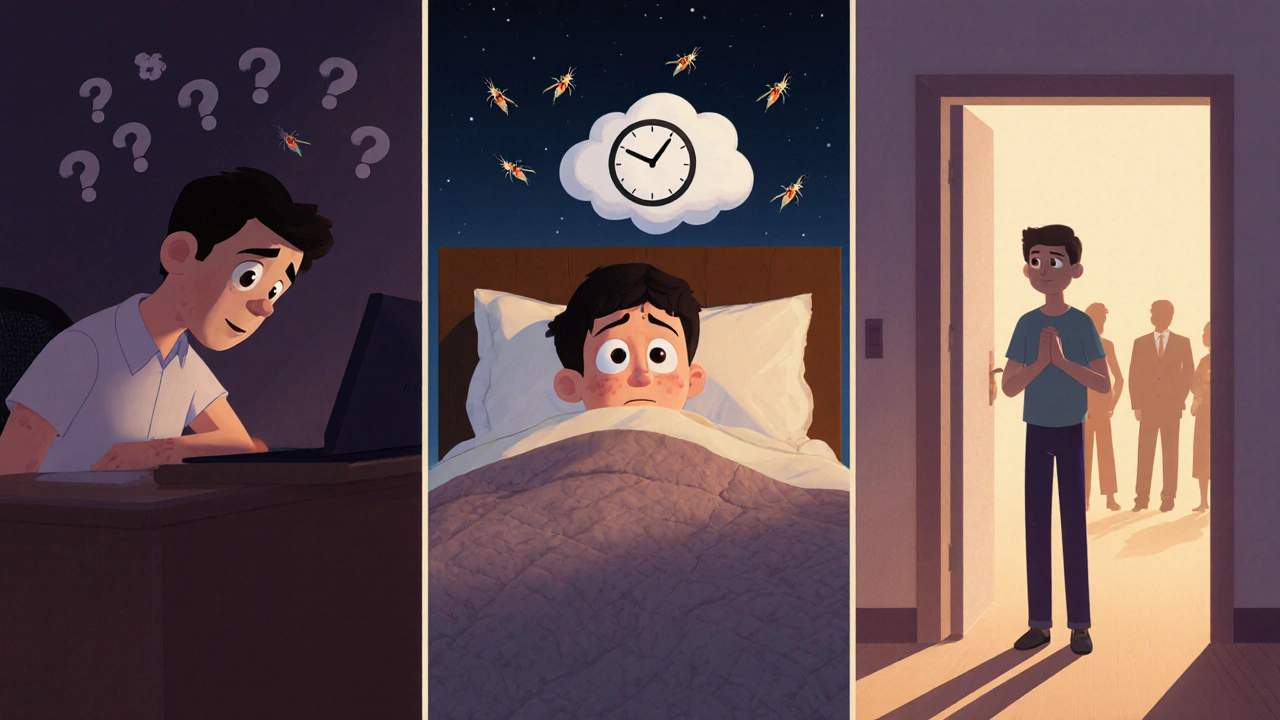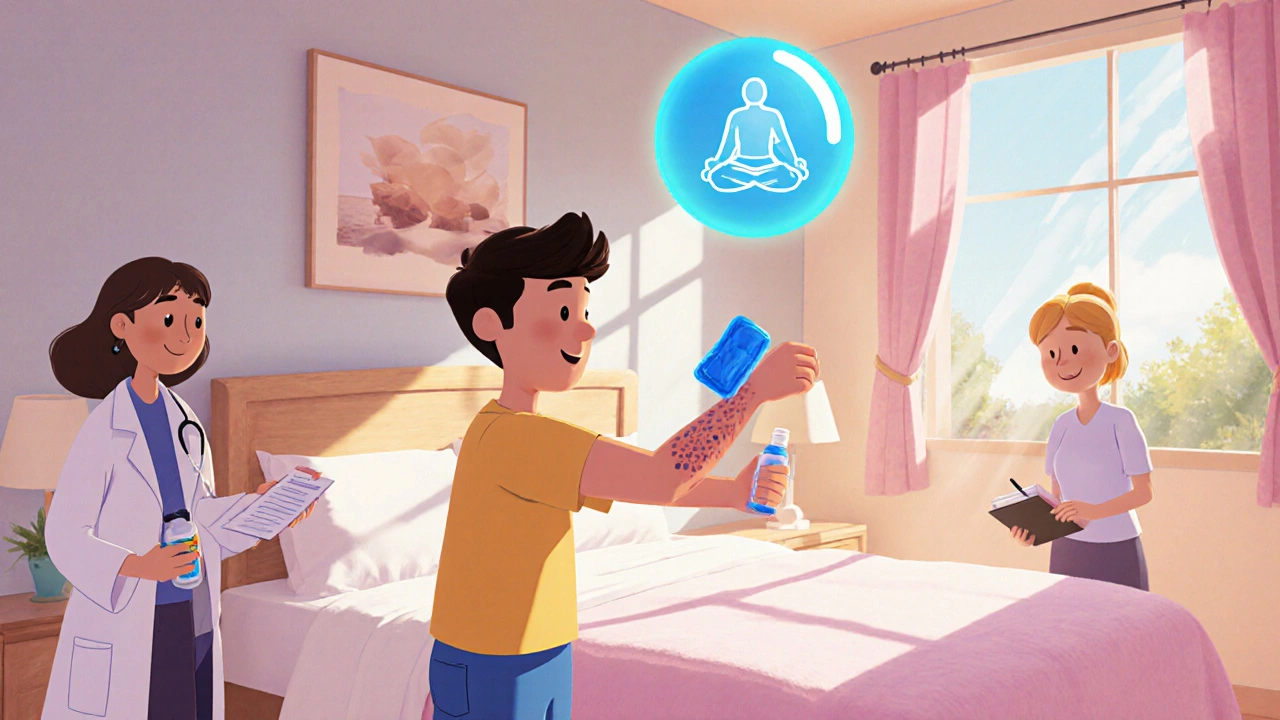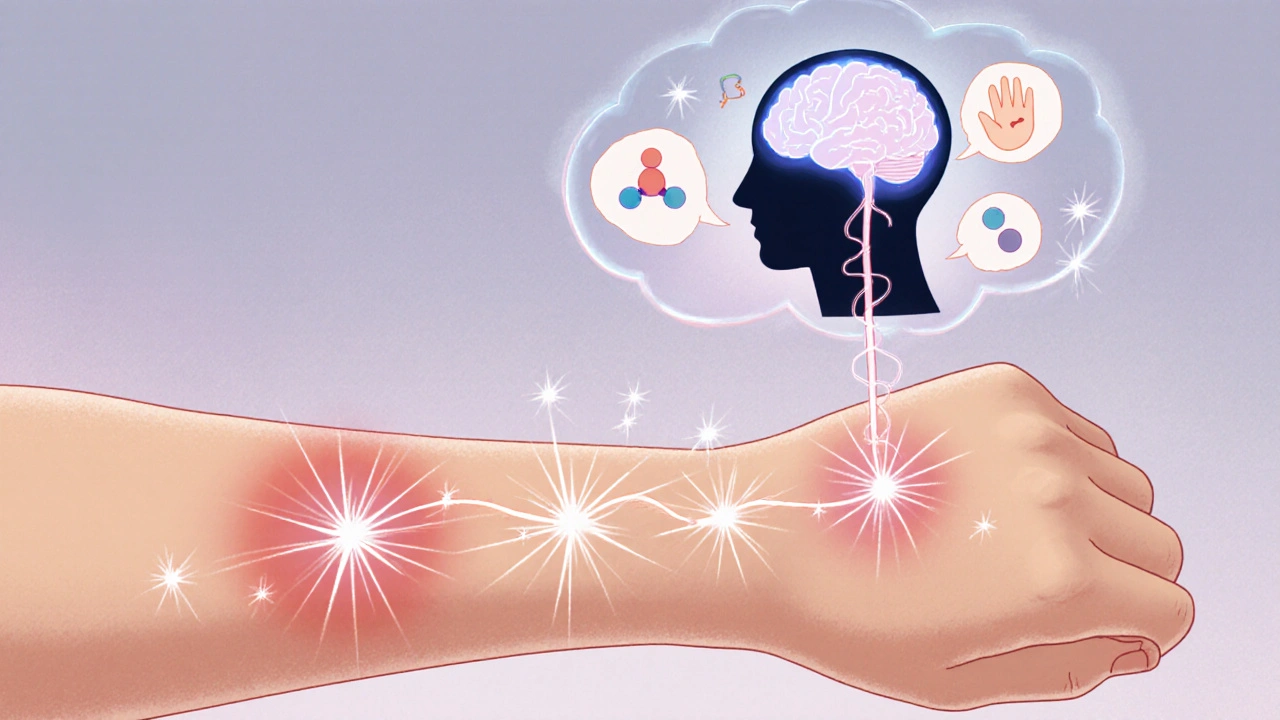Chronic Itch Psychological Impact Assessment Tool
This tool helps you identify which psychological impacts you're experiencing from chronic itch and suggests personalized coping strategies based on your responses.
Your Results
When an itch won’t quit, it does more than drive you crazy-it can mess with your head. Chronic itch is a persistent sensation that forces you to scratch for weeks, months, or even years. It isn’t just a skin problem; it’s a brain‑body loop that can erode mood, wreck sleep, and lower your sense of well‑being.
What counts as chronic itch?
Medical professionals label any itching that lasts longer than six weeks as Chronic itch. It shows up in conditions like eczema, psoriasis, liver disease, and even nerve‑damage disorders. The key point is that the symptom hangs around long enough to trigger secondary problems, especially psychological ones.
Why the brain cares about a skin sensation
The link between skin and brain is tighter than you might think. Nerve fibers in the skin release Histamine and other chemicals that travel straight to the spinal cord and then to the brain’s itch‑processing centers. At the same time, the brain pumps out Neurotransmitters like serotonin and dopamine, which can amplify the urge to scratch. This two‑way conversation means that a tiny flare on the skin can light up anxiety circuits in the mind.
Psychological fallout you’re likely to notice
Living with an itch that never quits creates a perfect storm for several mental‑health issues. Here are the most common ones:
- Anxiety - The constant need to scratch makes you feel on‑edge, especially in public settings where you worry about looking odd.
- Depression - Repeated failure to relieve the sensation can lead to feelings of hopelessness.
- Sleep disturbance - Itch spikes at night, breaking sleep cycles and leaving you exhausted.
- Reduced quality of life - Social activities, work productivity, and personal relationships all take a hit.
Each of these effects feeds back into the itch loop, making the sensation feel even worse.

How inflammation fuels the mind‑body loop
Chronic skin conditions often involve high levels of Cytokines, signaling proteins that keep the immune system on high alert. Cytokines such as interleukin‑6 (IL‑6) have been shown to cross the blood‑brain barrier and trigger mood‑altering pathways. In other words, the inflammation that fuels the itch also nudges the brain toward anxiety and depression.
Comparing the main psychological impacts
| Effect | Typical Signs | Common Triggers |
|---|---|---|
| Anxiety | Restlessness, worry about scratching in public | Visible flare‑ups, social situations |
| Depression | Low mood, loss of interest, fatigue | Continuous itch, failed relief attempts |
| Sleep disturbance | Frequent awakenings, difficulty falling asleep | Nocturnal itch peaks, warm bedding |
| Reduced quality of life | Avoidance of activities, strained relationships | All of the above combined |
Seeing the symptoms side‑by‑side helps you pinpoint which area needs the most attention.
Practical coping strategies
Breaking the itch‑anxiety loop isn’t magic; it’s a set of habits and treatments you can try right now.
- Skin‑care routine: Keep the skin moisturized with fragrance‑free creams. A hydrated barrier lowers histamine release.
- Mental‑body awareness: When you feel the itch, pause and name the feeling (“I notice an itch, and I feel a bit anxious”). Labeling reduces automatic scratching.
- Mind‑fulness meditation: A 5‑minute daily practice can lower cortisol, the stress hormone that amplifies itch signals.
- Cold compresses: Applying a cool pack for 2‑3 minutes numbs the nerve endings, giving you a break from the cycle.
- Distraction techniques: Keep your hands busy with a stress ball, knitting, or a fidget toy. The brain redirects attention away from the itch.
- Sleep hygiene: Use breathable cotton sheets, keep the bedroom cool (around 18°C/65°F), and avoid caffeine after noon.
- Professional help: Talk to a dermatologist about topical steroids or antihistamines, and see a mental‑health therapist for CBT (cognitive‑behavioral therapy) aimed at itch‑related anxiety.
These steps work best when you blend skin‑focused treatment with mental‑health tactics.

When to call a professional
If you notice any of the following, it’s time to get expert help:
- Itch persists despite moisturizers and OTC antihistamines.
- You’re skipping work or social events because of the sensation.
- Sleep loss exceeds 2hours per night on a regular basis.
- Feelings of hopelessness, worthlessness, or thoughts of self‑harm appear.
Dermatologists can run tests to rule out underlying diseases, while psychologists can teach coping skills that target the emotional side of the problem.
Bottom line: treat the itch as both skin and mind issue
The takeaway? Ignoring the mental side of chronic itch only makes the loop tighter. By caring for both the epidermis and the psyche, you can reclaim comfort, sleep, and happiness. Start with one small habit today-maybe a nightly moisturizer or a five‑minute breathing exercise-and watch the ripple effect on your overall well‑being.
Frequently Asked Questions
Can stress cause itching?
Yes. Stress triggers the release of cortisol and other hormones that can increase histamine production, making the skin more prone to itch.
Is chronic itch a sign of a serious disease?
Sometimes. Persistent itch can be a symptom of liver disease, kidney failure, or nerve disorders, so a medical check‑up is wise if it lasts longer than six weeks.
Do antihistamines really help?
They work for itch driven by allergic pathways, but less so for neuropathic itch. Your doctor can suggest the right type.
How can I improve sleep if itching keeps me awake?
Cool your bedroom, use a light‑weight cotton sheet, apply a soothing moisturizer before bed, and try a short mindfulness session to lower the itch impulse.
Is therapy useful for chronic itch?
Cognitive‑behavioral therapy can teach you to reframe the urge to scratch, manage anxiety, and break the itch‑anxiety cycle.

Comments (11)
Dan Tenaguillo Gil
October 15, 2025 AT 21:57
Living with chronic itch feels like a relentless whisper that never quite fades. It can erode confidence, warp sleep patterns, and make everyday tasks feel like obstacles. The brain‑body loop you described is exactly why a multidisciplinary approach works best. First, keep the skin barrier healthy by using fragrance‑free moisturizers at least twice daily. Second, adopt a simple mindfulness habit: when the urge to scratch arises, pause, label the feeling, and breathe for ten seconds. This labeling technique has been shown to reduce the automatic motor response by engaging prefrontal circuitry. Third, consider temperature therapy-cool compresses for a few minutes can dampen nerve firing without the need for medication. Fourth, engage in gentle physical activity such as yoga or walking, which raises endorphins and can lower the perception of itch. Fifth, keep a nightly routine that includes a light stretch, a cool‑temperature bedroom, and a short meditation to calm cortisol spikes. Sixth, if over‑the‑counter antihistamines fall short, consult a dermatologist about prescription options like topical calcineurin inhibitors. Seventh, a therapist trained in CBT can teach you cognitive reframing techniques that directly target itch‑related anxiety. Eighth, building a support network-online forums, local groups, or trusted friends-provides validation and reduces social isolation. Ninth, track your symptoms in a journal, noting triggers such as stress, weather changes, or diet, to identify patterns you can modify. Tenth, stay hydrated and maintain a balanced diet rich in omega‑3 fatty acids, which have modest anti‑inflammatory benefits. Finally, remember that progress is often incremental; celebrate each small victory, whether it’s a night of uninterrupted sleep or a week with fewer scratching episodes. Over time, these combined practices can loosen the vicious itch‑anxiety loop and restore a sense of control over both skin and mind.
Ellie Chung
October 22, 2025 AT 02:45
Wow, the itch saga you painted is like a wild carnival of sensations that never seems to end! Every time I think I've tamed the scratch monster, it pops up with a fresh burst of fiery flamboyance. Your step‑by‑step toolbox feels like a treasure chest of glittering hacks, especially that cool‑compress party trick-so refreshingly simple. I love the idea of labeling the itch; it's like giving a nametag to an annoying guest and then politely showing them the door. And the night‑time ritual? Picture me in a cozy cocoon of cotton sheets, sipping chamomile dreams while a gentle mantra plays in the background. Keep sprinkling those golden nuggets of insight, because they turn a dreaded itch‑loop into a manageable dance.
Sophia Simone
October 28, 2025 AT 06:33
While the preceding advice is commendably comprehensive, it overlooks the paramount importance of evidence‑based pharmacotherapy as the cornerstone of chronic itch management. One must recognize that behavioral strategies, however well‑intentioned, cannot supplant the mechanistic relief afforded by targeted systemic agents such as Janus kinase inhibitors. Moreover, the suggestion to rely heavily on mindfulness may inadvertently trivialize the severe neuroinflammatory pathways that underlie pruritic disorders. In clinical practice, a judicious combination of dermato‑pharmacological regimens and rigorously monitored psychosocial interventions yields superior outcomes. Therefore, the hierarchy of treatment should be reordered to prioritize pharmacologic control before ancillary coping mechanisms.
Dean Briggs
November 3, 2025 AT 11:21
It strikes me that chronic itch is not merely a peripheral nuisance but a profound existential challenge that compels us to reconsider the mind‑body dichotomy. When we acknowledge that the skin is an extension of our nervous system, we begin to see scratching as a language of distress rather than a simple habit. In this light, each flare becomes an invitation to dialogue with our inner state, urging us to explore underlying anxieties that may have been silently festering. Collaboratively, we can construct a therapeutic tapestry woven from dermatologic care, cognitive reframing, and purposeful habit formation. For instance, integrating a short, focused breathing exercise at the first sign of an itch can interrupt the habitual loop, much like a moderator stepping in during a heated debate. Additionally, fostering a community of peers who share coping scripts creates a collective resilience that magnifies individual effort. It is also worthwhile to reflect on the philosophical notion that suffering, when observed without judgment, loses its tyrannical grip. By cultivating a stance of curious observation, we transform the itch from an adversary into a subtle teacher. Moreover, setting realistic micro‑goals-such as reducing nighttime scratching by one episode per week-provides tangible milestones that reinforce self‑efficacy. Pairing these goals with a journal that records subjective intensity and contextual triggers yields valuable data for iterative refinement. In this synergistic approach, the skin, the brain, and the spirit converge toward a harmonious equilibrium. Ultimately, the journey is less about eradicating the itch entirely and more about reshaping our relationship with it, thereby reclaiming agency over both comfort and consciousness.
Sadie Speid
November 9, 2025 AT 16:09
Great tips! Keep that moisturizer on hand and remember a quick five‑minute breath reset can work wonders for both skin and mind.
Sue Ross
November 15, 2025 AT 20:57
I hear how isolating the relentless itch can feel, especially when it hijacks precious sleep and social moments. It’s comforting to know you’re not alone; many have walked this thorny path and found relief through the very steps you outlined. Taking the time to log triggers and celebrate tiny victories can gently shift the narrative from hopelessness to hope. Stay kind to yourself as you experiment with each strategy, and reach out for professional support whenever the burden feels too heavy.
Rohinii Pradhan
November 22, 2025 AT 01:45
Permit me to point out several deficiencies in the preceding exposition. The author neglects to cite primary literature regarding cytokine‑mediated mood alteration, thereby undermining the scientific credibility of the argument. Furthermore, the recommendation to “keep a stress ball” is trite and lacks empirical support, bordering on anecdotal fluff. A rigorous analysis would incorporate randomized controlled trial data to substantiate each suggested intervention. Lastly, the prose suffers from inconsistent terminology; “itch‑anxiety loop” should be standardized to “pruritic‑anxiety feedback circuit” for precision. I urge future contributions to adhere to scholarly conventions and provide verifiable references.
Anna-Lisa Hagley
November 28, 2025 AT 06:33
The presented coping framework aligns with current biopsychosocial models, yet its practical implementation remains vague. While mind‑body awareness and cold compresses are mentioned, the absence of dosage parameters-such as duration of compression or frequency of mindfulness sessions-limits reproducibility. Moreover, the interplay between systemic anti‑inflammatory agents and psychological therapies warrants deeper exploration, as synergistic effects could potentiate outcomes. A systematic approach that integrates measurable endpoints would enhance both clinical utility and research validity.
A Walton Smith
December 4, 2025 AT 11:21
Itch kills sleep.
Theunis Oliphant
December 10, 2025 AT 16:09
Behold, the tragedy of a mind tormented by an unrelenting itch! It is as if the very skin rebels against the soul, demanding attention while the world turns a blind eye. Such suffering should not be dismissed as mere inconvenience but condemned as a moral failing of our neglectful society. We must rise, armed with compassion and disciplined routine, to vanquish this vile affliction and restore dignity to those who endure.
India Digerida Para Occidente
December 16, 2025 AT 20:57
Understanding both the physiological and psychological dimensions of chronic itch is essential for holistic healing, so let us unite clinicians, therapists, and patients in a shared mission to break the cycle. By fostering open dialogue, we can tailor treatment plans that respect each individual’s experience while upholding evidence‑based standards. Together, we can transform the narrative from one of despair to one of empowered resilience.